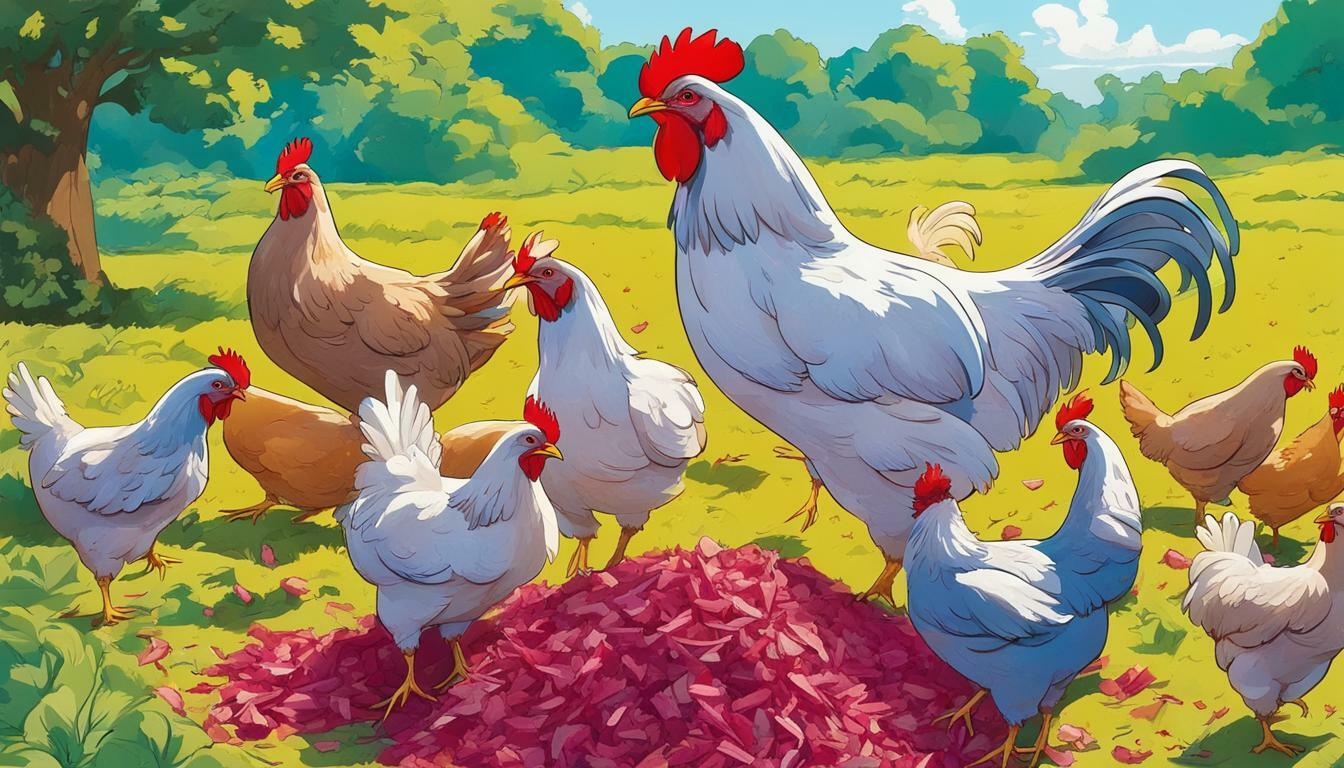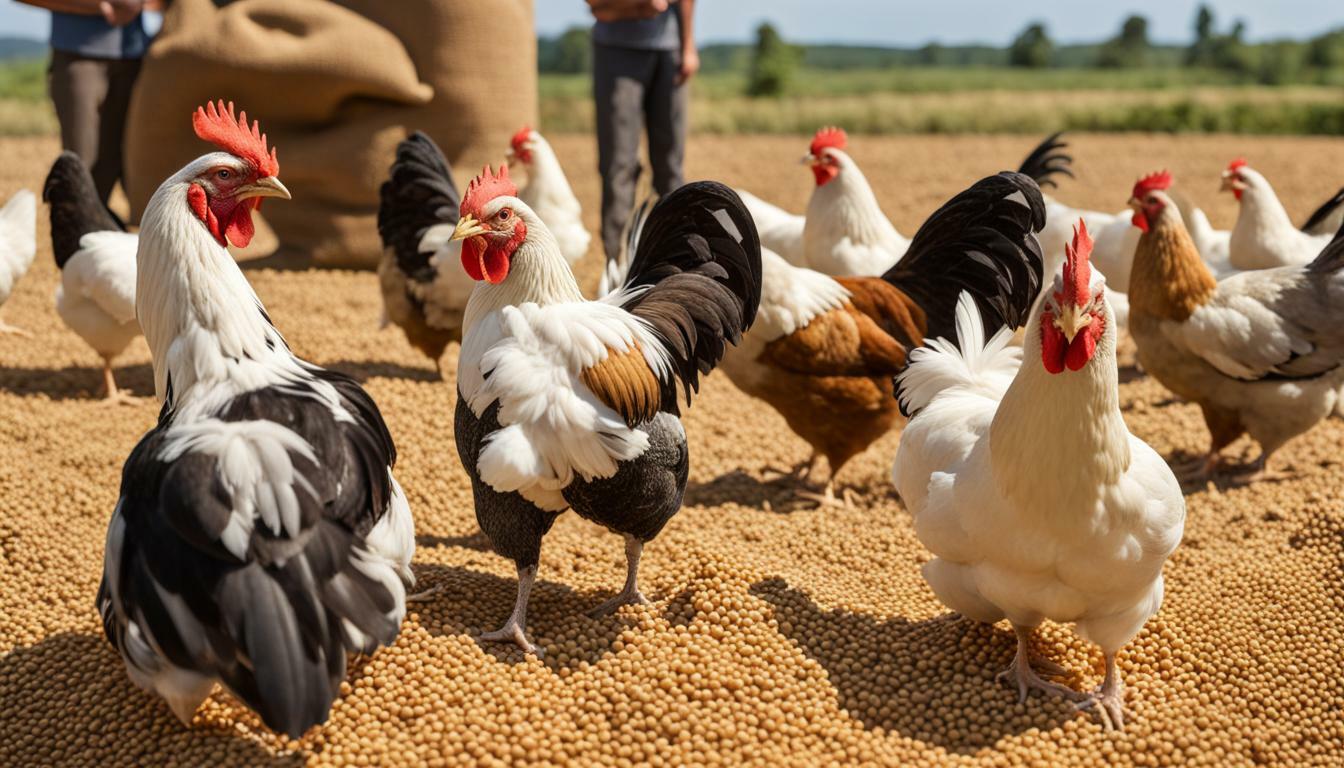Can Chickens Eat Beet Pulp? A Nutritious Treat for Your Flock

Table of content:
- What Are The Benefits of Feeding Chickens Beet Pulp?
- Is Beet Pulp High in Sugar for Chickens?
- Will Beet Pulp Affect Egg Yolk Color?
- How Much Beet Pulp Should You Feed Chickens?
- Should You Soak Beet Pulp Before Feeding to Chickens?
- Can Chickens Overeat Beet Pulp?
- What is a Good Beet Pulp to Feed Ratio for Chickens?
- Is Beet Pulp a Necessary Part of a Chicken’s Diet?
- Are There Any Health Risks Associated with Feeding Chickens Beet Pulp?
- Final Thoughts
Backyard chicken keepers are always looking for cost-effective ways to feed their flock a nutritious diet. One supplement that is growing in popularity is beet pulp. Beet pulp is a fibrous byproduct left over after processing sugar beets for sugar production.
This affordable, natural supplement has many benefits for chickens. But can chickens eat beet pulp? Let’s look at the pros and cons.
What Are The Benefits of Feeding Chickens Beet Pulp?
There are several reasons why chicken keepers add beet pulp to their flock’s diet:
- Beet pulp is high in digestible fiber. The insoluble fiber in beet pulp can promote good digestion and gut health in chickens.
- It provides a boost of minerals like iron, calcium, and phosphorus essential for strong eggshells.
- Beet pulp contains beta-carotene, an antioxidant that chickens convert to vitamin A. Vitamin A supports immune function and feather growth.
- The sugars in beet pulp offer chickens an energy boost. The natural sugars may also stimulate appetite in finicky eaters.
- As a vegetable byproduct, beet pulp is very affordable compared to commercial feeds. This makes it a budget-friendly supplemental feed.
- Offering beet pulp can provide environmental enrichment. Chickens enjoy foraging through the long shreds of pulp.
- The dark red color of beet pulp can lead to richer-colored egg yolks if fed just before egg laying.
Is Beet Pulp High in Sugar for Chickens?
Beet pulp is high in sugar compared to other natural treats. Sugar beets contain about 75-80% water, 15-20% sugar, and 5-10% protein and fiber.
This may make some chicken keepers wary of feeding excessive amounts. Too much sugar could cause digestive upset, diarrhea, weight gain, and other health issues in chickens.
However, in moderation, the sugars in beet pulp provide a quick energy source. The natural sugars are not as harmful as refined sugars. The fiber in beet pulp also slows down sugar absorption.
Overall, the benefits of beet pulp likely outweigh the sugar content concerns for most backyard chickens.
Will Beet Pulp Affect Egg Yolk Color?
One reason chicken owners feed their hens beet pulp is for darker egg yolk color. The beta-carotene and xanthophylls in beets can lead to richer yellow-orange yolks.
For the deepest color, it’s best to feed chickens beet pulp just before their egg laying time. This allows the pigments to be deposited into the developing yolk.
But other factors also affect yolk color. Breed, diet, foraging, and seasonal changes can all influence color too. So beet pulp alone may not produce extremely dark yolks.
As long as you don’t overfeed, supplementing with beet pulp can naturally deepen yolks. But it takes trial and error to find the right amount for your flock.
How Much Beet Pulp Should You Feed Chickens?
There are no strict rules on how much beet pulp chickens can eat. Consider these guidelines when supplementing with beet pulp:
- Start with small amounts like 1-2 tablespoons per chicken daily.
- Slowly increase over 2-3 weeks, monitoring chickens for signs of digestive upset.
- Feed 1-2 cups per chicken per day for maximum benefits.
- Limit feeding to 2-3 times per week to control sugar intake.
- Reduce or stop feeding if chickens develop loose droppings.
- Adjust amounts depending on time of year and egg production level.
- Feed more beet pulp in winter when sunshine is limited.
- Feed less when chickens have access to fresh forage and bugs.
- Follow label instructions if using commercial blends with beet pulp.
Monitor your flock and find the optimal beet pulp amount that works for your chickens’ needs.
Should You Soak Beet Pulp Before Feeding to Chickens?
Beet pulp comes in a dry shredded form. Some chicken owners prefer to soak it before feeding to reduce dust and soften it up.
But chickens can eat it dry with no issues. The insoluble fiber is healthy for their crop and gizzard.
Soaking beet pulp makes a mash consistency that chickens can eat right away. But it’s not required.
If you want to soften it up, add water just until it reaches a moist crumble texture. Avoid soaking it into a wet sloppy mash.
Feed soaked beet pulp within a day or two to prevent spoiling.Make sure it smells fresh before serving.
Can Chickens Overeat Beet Pulp?
Chickens love treats and will overindulge if given the chance. While beet pulp offers many benefits, too much can cause problems.
Here are signs your flock may be getting too many beets:
- Increased watery droppings or diarrhea
- Lethargy or loss of appetite
- Weight gain or obesity
- Loose, pale-colored yolks
- Decreased egg production
- Inflamed or impacted crop
To prevent overeating:
- Feed beet pulp in moderation 2-3 times per week maximum.
- Limit treats to 10% of the total diet.
- Offer pulp in spaced out small meals rather than free-choice.
- Provide in a shared feeder to prevent boss hens hogging.
- Distract chickens with foraging opportunities.
- Provide insoluble fiber from sources like oats, vegetables, or whole grains.
What is a Good Beet Pulp to Feed Ratio for Chickens?
When adding beet pulp to your chickens’ diet, start with a 10:1 ratio of regular feed to beet pulp.
For example, for every 1 cup of beet pulp, provide 10 cups of their normal feed blend.
Gradually work up to a 4:1 or 2:1 ratio over a few weeks.
Monitor egg quality and manure consistency at higher ratios. Loosen ratios if you notice adverse effects.
Free-choice oyster shell, grit, and clean water are important when feeding beet pulp. Insoluble fiber sources help balance out the soluble fiber in beet pulp too.
Is Beet Pulp a Necessary Part of a Chicken’s Diet?
While nutritious, beet pulp is not essential for backyard chickens. A balanced commercial feed or homemade mix provides all the protein, carbs, vitamins, and minerals chickens need.
Think of beet pulp as a supplemental treat richer in certain nutrients. It adds diversity and enriches their diet. But it’s possible to raise healthy, productive chickens without feeding beet pulp at all.
Many natural treats offer similar benefits to beet pulp:
- Chopped veggies provide beta-carotene, fiber, and antioxidants.
- Dark leafy greens add xanthophylls for yolk color.
- Squash and pumpkins offer vitamin A for immunity.
- Fruits add natural sugars for quick energy.
Rotate different natural treats to give your flock variety. Beet pulp can be part of a diverse supplemental feeding plan.
Are There Any Health Risks Associated with Feeding Chickens Beet Pulp?
Overall, beet pulp is a safe supplemental feed for backyard chickens. But improper feeding can cause some risks, including:
- Digestive upset – Too much beet pulp can lead to loose droppings or diarrhea. Reduce feeding amounts if this occurs.
- Dehydration – The sugar in beet pulp could cause dehydration. Always provide unlimited clean drinking water.
- Weight gain – Overfeeding pulp can lead to obesity, which strains the heart and joints. Monitor body condition and limit treats.
- Crop impaction – Beet pulp expands in the crop. Impaction is unlikely but can happen if chickens overeat.
- Egg eaters – Rich yolk color from beets could encourage hens to eat eggs. Provide abundant protein, calcium, and space to discourage this habit.
- Rodents – Wet beet pulp can attract mice and rats. Only offer small amounts chickens can eat in one sitting.
With proper feeding techniques, beet pulp carries low risk and high nutritional rewards.
Final Thoughts
When fed in moderation, beet pulp can be a nutritious supplement for backyard chickens. The natural sugars provide energy while the digestible fiber supports gut health. Beet pulp also adds valuable vitamins and minerals to a balanced diet.
Pay attention to your flock’s health and production when adding this fibrous fermented feed. Adjust amounts slowly over time to find the right beet pulp ratio for optimal benefits. By following feeding best practices, you can safely feed your flock this budget-friendly supplement.
Your chickens will relish this tasty treat while reaping the nutritional perks. Beet pulp should be a staple in every chicken keeper’s treat rotation when fed responsibly. Let your flock enjoy the vibrant color and flavor of beets for a boost to their overall diet and wellbeing.
Welcome. I’m Adreena Shanum, the proud owner of this website, and I am incredibly passionate about animals, especially poultry. I founded adreenapets.com as a labor of love, stemming from my desire to share my knowledge and experiences with poultry enthusiasts worldwide.




